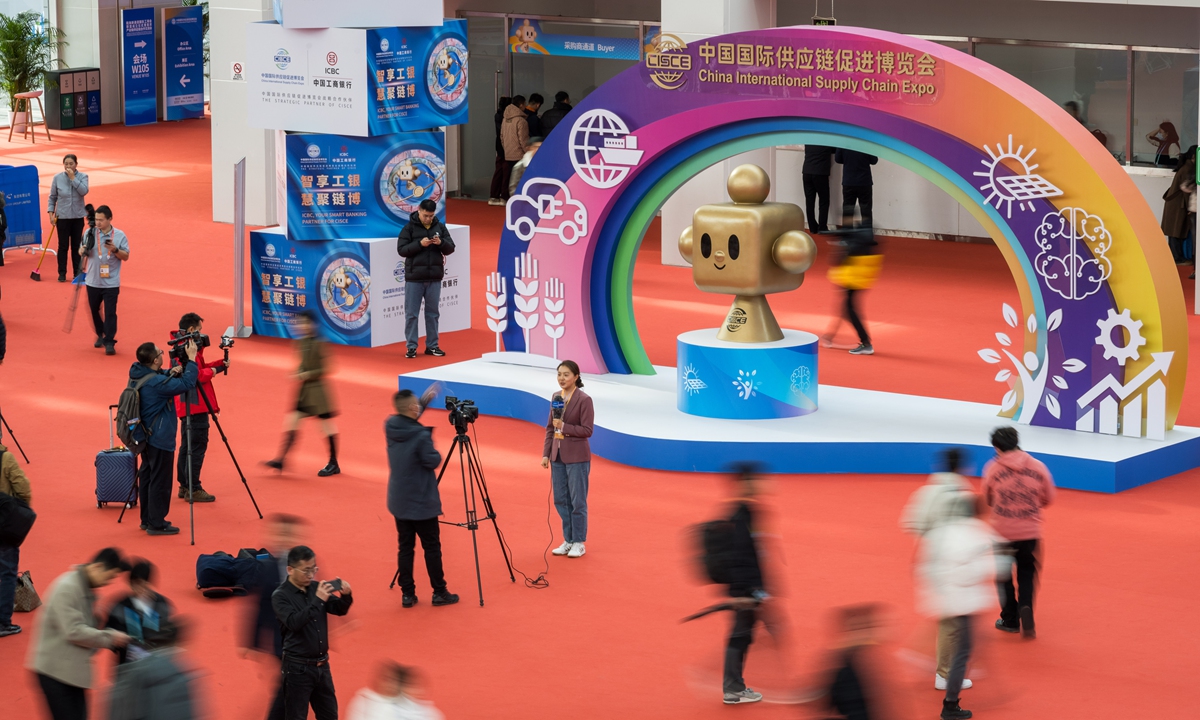
Reporters talk to the camera at the 2nd China International Supply Chain Expo, which kicked off on November 26 in Beijing. Photo: Chen Tao/GT
As over 1,300 participants from over 100 countries and regions as well as international organizations attended the opening ceremony of the second China International Supply Chain Expo (CISCE), which kicked off on Tuesday in Beijing, Chinese Vice President Han Zheng called for promoting win-win cooperation, optimization and upgrading as well as green transition of global industrial and supply chains.
China will adhere to the right course of economic globalization and enhance business and industrial capacity cooperation with other countries for a positive interplay among industries and shared benefits, Han said, the Xinhua News Agency reported.
At the opening ceremony on Tuesday, a Beijing initiative for stable and smooth global industrial and supply chains was unveiled.
On Monday, Chinese Premier Li Qiang, while attending a symposium with representatives of enterprises and organizations participating in the second CISCE,
said China will continue to take concrete action to ensure stable and unimpeded global industrial and supply chains.
Join hands, no arm wrestlingGovernment officials and representatives from the global business community and institutions from more than 100 countries and regions attending the second CISCE opening ceremony on Tuesday took to the stage to express their support for globalization, and voiced their concerns about decoupling and attempts to undermine global industrial and supply chain cooperation.
Observers noted that the global economic stage should be one where partners seek common growth and a shared future by joining hands, rather than by engaging in arm wrestling. They urged governments around the world to work toward ensuring the smooth flow of the global industrial and supply chain.
Chinese analysts said that in face of the sluggish global economic recovery, collaboration and seeking win-win benefits is the only path to ensure the prosperity of global trade, which is the foundation of well-being for the peoples of the world.
Anti-globalization and the fragmentation of the global supply chain will only add costs and incur losses, they noted.
"In Europe, a great meeting of the Eastern and Western economies has been created in Hungary. If you want to see big German factories and big Chinese factories built on neighboring plots next door to each other, please come to Hungary. Our strategy of economic neutrality will make 2025 a fantastic year for the Hungarian economy through the enhanced cooperation between China and Hungary," Hungarian Minister of Foreign Affairs and Trade Peter Szijjarto said in his speech at the opening ceremony of the second CISCE.
"Hungary is honored to be the country of honor here," Szijjarto said. "We will take the best profit out of our presence here."
In face of an increasingly complex global economic landscape and rising protectionist headwinds, guests including global business leaders and top executives expounded the benefit of connectivity, as well as the cost of fragmentation.
"A single tree does not make a forest, and a single string does not make music. We can achieve more when we work together, and the bigger the challenge, the more essential cooperation becomes," Dominic Barton, chair of Rio Tinto, said during his speech at the opening ceremony.
"It is important that we speak up and come out of the shadows to defend and promote supply chain coordination and free trade. It is essential for all of our prosperity," Barton said.
As the World Bank estimates, a 1 percent increase in participation in the international supply chain is associated with a more than 1 percent increase in per capita income to see the direct link between trade and prosperity, the chair of the mining giant said.
Another example, according to Barton, is that in a scenario where countries block made-in-China products in clean energy, such as solar panels, wind turbines and lithium batteries, Wood Mackenzie estimated that global energy transition costs would rise by 20 percent, or at least the equivalent of $6 trillion.
Confidence boosterBolstered by the country's recent slew of incremental policies aimed at injecting vitality into growth momentum, there is rising confidence from the global business community.
On Monday, Premier Li Qiang said that China has achieved generally steady economic growth and made further progress this year, saying that more efforts will be made to step up counter-cyclical adjustment and promote sound economic development.
"At CP Group, we are very confident in the Chinese economy. The package [of incremental policies] is thorough and considerate. As entrepreneurs, we are heartened. The overseas Chinese business community is also heartened," Dhanin Chearavanont, senior chairman of Thailand's Charoen Pokphand Group and dubbed the "001 foreign investor to China (among the first foreign investors when China launched the reform and opening-up)," told the Global Times on the sidelines of the event.
Compared with the first edition of the expo held in 2023, this year's event has seen a growing attendance from global and domestic companies, many of them giants in their sector.
China Council for the Promotion of International Trade Chairman Ren Hongbin said the world is seeing the CISCE, the world's first and only one of its kind devoted to supply chain cooperation, with growing recognition both in China and globally.
"A platform to foster unity and enhance collaboration is what the world sorely needs at this moment of rising anti-globalization, unilateralism and protectionism," Ren said.
Huo Jianguo, a vice chairman of the China Society for World Trade Organization Studies in Beijing, told the Global Times on Tuesday that the world's second-largest economy is consolidating its growth momentum with improved quality and constant efforts to optimize its business environment. The attractiveness of the China market and Chinese supply chain will grow stronger and more multinational companies will place their bets on China, Huo noted.




